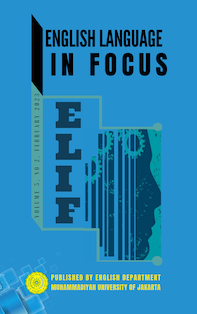Islamic Moral Education Values in the Selection Poems on the Life of Prophet Muhammad by Paul Abdul Wadud Sutherland and Its Implication on Students’ Literature Learning
DOI:
https://doi.org/10.24853/elif.5.2.131-146Keywords:
Moral education values, poetry, literature learningAbstract
This research contains literary learning in the poetry genre entitled Poems on the Life of the Prophet Muhammad by Paul Abdul Wadud Sutherland. This poem has the moral education value of Al-Islam and Kemuhammadiahan which is the main focus of this research because moral values is one of the basic foundations of human nature which is closely related to human behavior with God. This research aims to obtain a deep understanding of moral values in the form of divine values and human values from the collection of poems Poems on the Life of the Prophet Muhammad by Paul Abdul Wadud Sutherland. This research uses a qualitative method and content analysis design. The research finding showed that Shutherland’s Poems on the Life of the Prophet Muhammad contained the Islamic moral education values namely illahiyah values and insaniyah values that can be good examples for students’ daily life.References
Amri, Muhammad & Saharuddin, Saharuddin & Ahmad, La Ode. (2019). The Implementation of Islamic Education: The Process of Instilling Akhlakul Karimah (Noble Characters) for Madrasah Tsanawiyah Students. Tadris: Jurnal Keguruan dan Ilmu Tarbiyah. 4. 117-125. 10.24042/tadris.v4i1.4070.
Creswell, John W. (2014). Research Design: qualitative, quantitative, and mixed methods approaches. 4th ed. California : SAGE Publications, Inc
Eka Mulatsih, Maria. (2018). Learning Poetry As A Strategy To Develop Students’ Teaching Skills. International Journal of Indonesian Education and Teaching. 2. 120-128. 10.24071/ijiet.2018.020203.
Emzir. 2011. Metodologi Penelitian Kualitatif Analisis Data. Jakarta : PT Raja. Grafindo Persada
Hariyanti, Tatit & Sudjito, Sudjito. (2018). Susutained Character Building through Literature For College Students In Indonesia. Jurnal Dinamika Hukum. 18. 109. 10.20884/1.jdh.2018.18.1.1707.
Kc, Rejina. (2021). Role of Poetry in English Language Learning: A Review of Literature. Journal of NELTA
Khozin. (2013). Khazanah Pendidikan Agama Islam. Bandung: PT Remaja Rosdakarya.
Irmawati, Noer Doddy. (2014). Understanding how to Analyze Poetry and its Implication to Language Teaching. International Journal on Studies in English Language and Literature (IJSELL) Volume 2, Issue 11, November 2014, PP 35-45 ISSN 2347-3126 (Print) & ISSN 2347-3134
Majid, Abdul dan Andayani, Dian. (2012). Pendidikan Karakter Perspektif Islam. Bandung: PT Remaja Rosdakarya
Nica, Marius. (2011). Teaching Poetry to Undergraduate Students. Procedia - Social and Behavioral Sciences. 11. 215-219. 10.1016/j.sbspro.2011.01.064.
Nurhamidah, Idha & Purwanto, Sugeng & Ekaningsih, Nur. (2019). A literary work as self-reflection of the author: Why and how it is manifested. EduLite: Journal of English Education, Literature and Culture. 4. 194. 10.30659/e.4.2.194-203.
Rhee, Jooyeon. (2011). On "The Value of Literature" and "What Is Literature?". Azalea: Journal of Korean Literature & Culture. 4. 10.1353/aza.2011.0003.
Sugiyono. (2013). Metode Penelitian Pendidikan Pendekatan Kuantitatif, Kualitatif, dan R&D. Bandung: Alfabeta
Sutherland, Paul Abdul Wadud. (2014). Poems on The Life Of The Prophet Muhammad. UK: Muslim Academic Trust
Syamsia and Ismail, Hamid. (2021). Teaching English Poetry in EFL Classroom through Classroom Presentation. Langua – Journal of Linguistics, Literature, and Language Education Vol. 4, No. 1
Widyahening, Evy Tri, dan Wardhani, Nugraheni Eko. (2016). Literary Works and Character Education. International journal of language and literature. http://ijll-net.com
Sungkowo. (2014). Konsep Pendidikan Akhlak (Komparasi Pemikiran Al-Ghazali Dan Barat). NUR EL-ISLAM : Jurnal Pendidikan Dan Sosial Keagamaan, 1(1), 33-62. Retrievedfrom https://ejurnal.iaiyasnibungo.ac.id/index.php/nurelislam/article/view/52
Published
Issue
Section
License
Authors who publish with this journal agree to the following terms:
- Authors retain copyright and grant the journal right of first publication with the work simultaneously licensed under a Creative Commons Attribution License that allows others to share the work with an acknowledgment of the work's authorship and initial publication in this journal.
- Authors can enter into separate, additional contractual arrangements for the non-exclusive distribution of the journal's published version of the work (e.g., post it to an institutional repository or publish it in a book), with an acknowledgment of its initial publication in this journal.
- Authors are permitted and encouraged to post their work online (e.g., in institutional repositories or on their website) before and during the submission process, as it can lead to productive exchanges, as well as earlier and greater citation of published work (See The Effect of Open Access).


